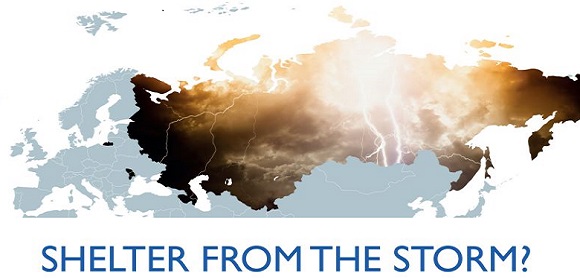A parliamentary seminar to launch a new publication on the plight of political dissidents and refugees also drew attention to Europe’s complicity, via asylum policy and extradition requests, in repression in the Commonwealth of Independent States.
A new publication by the Foreign Policy Centre, Shelter from the Storm? The asylum, refugee and extradition situation facing activists from the former Soviet Union in the CIS and Europe, looks at some of the key issues faced by individuals fleeing the risk of persecution in and around the Commonwealth of Independent States (CIS). With a focus on nationals of former Soviet Central Asian states, in view of the particularly poor human rights situation there, experts on the region report on challenges both in other CIS countries and European Union (EU) states.
The publication was launched at a seminar in the House of Commons on 29 April, chaired by Baroness Stern, chair of the All Party Parliamentary Group (APPG) on Tajikistan, one of the countries concerned, and bringing together several of the contributing experts who shed further light on the issues they raised in the report.
Many in the region fleeing persecution turn to other countries in the CIS. There are many reasons for this: a common language (Russian), the relative ease of travel between states and diaspora communities in each, as well as the ability to move to another country without a visa. ‘Russia [is] the most popular destination within the … CIS.’
This gives individuals fleeing persecution the opportunity to move abroad without detection or coming to the attention of the authorities in their own country. For dissidents and activists, an asylum application can affect their family back home and their possibility of returning home once the immediate threat to their safety has receded. The threat of extradition is another serious problem, particularly given the close collaboration between security services in the region, and the vague definition of the crime(s) underpinning the extradition request allowed by the 1993 Minsk Convention, which governs extradition in the CIS.
The long arm of the state
Highlighting some of these threats, Dr David Lewis, from the University of Exeter, spoke about the impact Central Asian states can have beyond their own borders. ‘Post-Soviet authoritarian states view diaspora communities and political exiles as dangerous threats to their political dominance at home’, he said. They seek to expand domestic modes of repression abroad, sometimes with the cooperation of foreign authorities, such as through extradition requests and Interpol ‘red notices’. Such activities bring their politics into foreign jurisdictions, ‘but also serve to export the dynamics of political repression around the world.’ This includes ‘extensive propaganda exercises to discredit political exiles, creating a discourse in which diasporas and citizens based abroad are seen as potential security threats’. It also includes surveillance and intelligence-gathering.
Uzbekistan, for example, has a surveillance network and spy circles abroad, especially in Russia. Within the EU, there are growing reports of ‘refugee espionage’, where ‘asylum seekers have claimed that they are under surveillance by Uzbek intelligence or informers’. One Uzbek refugee in Sweden said in a media interview that he had been pressurised by Uzbek intelligence officials to spy on other exiles. Sweden has responded by tightening the relevant legislation. Similar allegations have been made in other EU states.
The use of international policing mechanisms such as Interpol red notices affects an individual’s ability to travel, open bank accounts and work, for fear of detection, arrest and extradition. While EU states are unlikely to act on such notices, they can trigger extradition proceedings and make refugees afraid to travel to non-EU states. One politically-motivated arrest was that of former Tajik Prime Minister Abdumalik Abdullojonov who was arrested in Ukraine in February 2013, following the issue of an international arrest warrant by the Tajik authorities. The extradition proceedings were later dropped and he was released.
The best-known example of a Central Asian dissident facing extradition is Kazakh Mukhtar Ablyazov, currently in prison in France and fighting extradition to Kazakhstan, Russia and Ukraine. If extradited to Russia or Ukraine, there is a credible risk of his onward transfer to Kazakhstan, where there is a risk of torture. Russia in particular is often complicit in forced returns to such states. The UK authorities recently revoked his refugee status, granted in 2011.
For those fleeing Uzbekistan, there is also a risk of attack, even assassination, in other states.

Journalist Alisher Saipov was assassinated in Kyrgyzstan in 2007 and businessman and opposition activist Fuad Rustamkhojaev was killed in Russia in 2011. In 2012, Obidkhon Nazarov, a well-known Imam who had been granted asylum in Sweden, was shot and wounded at the entrance to his block of flats in Strömsund. Human rights activists claimed the Uzbek security services were behind the attempted assassination.
According to Dr Lewis, while ‘silencing voices abroad further deepens authoritarian consolidation at home and makes political reform and modernisation more difficult to achieve’, it also undermines the rule of law in other states. In Europe, he said, it has ‘undermined due process and legal defence of asylum-seekers’, which is ‘likely to result in a negative impact on a wider range of civil liberties in the long run’.
Diplomatic assurances
The widespread use of diplomatic assurances to enable deportation to torturing states is one example of this, which Maisy Weicherding, Amnesty International’s Eurasia researcher, spoke about at the seminar. In the chapter she co-wrote with her colleague Julia Hall, they defined diplomatic assurances as ‘promises from one government to another that persons forcibly returned via deportation or extradition will not be tortured or ill-treated upon their return’. Authorities in the CIS frequently resort to these non-binding instruments to seek the extradition of dissidents and exiles, pointing to their extensive use by EU states and Canada.
Diplomatic assurances not to torture can be dangerous as they entail obtaining further assurances from states that are already bound by, but ignore, domestic and international laws. They also do not include an enforcement mechanism. Countries that torture seldom investigate or prosecute claims of torture, and while monitoring mechanisms are sometimes a part of the agreement made, they are generally ineffective as returnees are often too afraid to report violations; torture victims seldom speak out about their experiences. It is also not in the interest of either the sending or receiving state to report breaches.
In the regional context, states mutually accept such assurances without criticism. The result for those returned to authoritarian Central Asian states is imprisonment and torture. A letter (included in a 2013 Amnesty report) was read out from a Tajik dissident who was abducted in Moscow in 2011 and forcibly returned to Tajikistan, telling of the ill-treatment he received at both ends.
Another Tajik national, Abdurazok Gaforov, was arrested in Moscow in 2008, having fled Tajikistan in 2006, after being accused, imprisoned and tortured for membership of a banned religious organisation, which he denies. On his appeal against extradition from Russia, the Russian authorities said Tajikistan had given diplomatic assurances that he would not be tortured, and a Moscow court dismissed his claim that he was at risk of torture. It stayed the extradition pending an application to the European Court of Human Rights, which in 2010 ruled against his extradition, stating that diplomatic assurances ‘are not in themselves sufficient to ensure adequate protection against the risk of ill-treatment where reliable sources have reported practices resorted to or tolerated by the authorities which are manifestly contrary to the principles of the [Human Rights] Convention’.
Interpol abuse
Lawyer Jago Russell from Fair Trials International spoke about his colleague Alex Tinsley’s chapter on the political abuse of Interpol red notices and diffusions. While cross-border cooperation has grown since 9/11, that cooperation has not been underpinned by compliance with human rights standards, and Interpol, a 190-member state agency, has become complicit in efforts to support repressive regimes as they pursue dissidents in exile. Interpol is used ‘to seek the arrest of such persons abroad on the basis of politically-motivated prosecutions’; trumped-up charges are pressed and the fight against extradition, even if successful, can take years.
Interpol thus gives legitimacy to the repressive actions of such states. As an organisation, it has an important role to play in arrests and extraditions worldwide, but its mechanisms are open to abuse if not monitored adequately. A red notice can lead to arrest and extradition which, even if avoided, can still destroy reputations, affect day-to-day life and create a culture of fear in exiled communities.

Russell gave the example of Petr Silaev, a Russian national who took part in a 2010 protest against a motorway development, during which there was damage to a government building. As protesters were arrested, he fled and claimed asylum successfully in Finland. Four months later, having been charged with ‘hooliganism’ in Russia, he was arrested in Spain, held for eight days and not allowed to leave the country for six months until the extradition request was rejected.The charge is still outstanding, affecting his ability to travel.
In 2002, there were 2,000 arrests based on Interpol information; by 2012, that number had risen to 9,000. The quantitative increase in information provided by Interpol has not been matched by an increase in its quality, thus aiding regimes to persecute individuals from afar. Interpol lacks an effective review mechanism; its red notices cannot be challenged and can only be removed by the issuing state. It has created a ‘legal black hole’.
European asylum policy
Claire Rimmer-Quaid from the European Council on Refugees and Exiles (ECRE) looked at the problems thrown up by the Common European Asylum System (CEAS), which the EU has been working on since 1999, the key objective of which is to ‘establish high standards of protection and ensure that similar cases are treated alike and result in the same outcome, regardless of the member state in which the asylum application is lodged’. A revised asylum package was adopted in July 2013, yet ECRE maintains that huge discrepancies in the way cases are treated remain across the EU. Challenges and obstacles to asylum seekers arise at all levels, from entry policy to free legal assistance, social assistance and the risk of detention without charge. Significantly, the recently ‘reformed’ Dublin Regulation (on the country responsible for considering the asylum application) is still ‘based on the flawed assumption that protection standards are equal or equivalent’ across member states.
According to the UNHCR’s Asylum Trends for 2013, the Russian Federation was the second source country, after Syria, for asylum applications in forty-four industrialised countries that year, the highest since 2003. Germany and Poland were the main destinations for refugees from the Russian Federation, and ‘Russia was the top country of origin of asylum seekers that year in Germany, Austria and Poland’. Several other CIS states ranked highly as well. Although the statistics are not disaggregated by ethnicity, ECRE concluded that of asylum seekers from the Russian Federation, the majority were from the Chechen Republic and elsewhere in the North Caucasus. There was also a rise in applications by human rights activists and protesters following the recent civil liberties crackdown and the protests in Bolotnaya Square.
Many from the Russian Federation who end up in Poland do not wish to stay there, often because of state surveillance and monitoring of refugee communities. The recognition rate of asylum seekers is also a lottery; in 2013, 11 per cent were granted refugee status, 2 per cent subsidiary status and 2 per cent authorised to remain for humanitarian reasons. However, the Dublin regulation does not permit them to seek asylum elsewhere in the EU.
The publication also refers to the problems faced by writers and artists, and issues specific to asylum in the Russian Federation. Felix Corley from Forum 18 provided examples where strong and positive intervention by local actors, lawyers and NGOs have made a difference to individuals fleeing persecution for ‘simply exercising their right to freedom of religion or belief’. A Protestant pastor and an Imam were among those whose extradition to Uzbekistan was successfully prevented (from Kazakhstan and Kyrgyzstan respectively).
RELATED LINKS
Read Shelter from the Storm, by the Foreign Policy Centre, here
Read Strengthening respect for human rights, strengthening INTERPOL, by Fair Trials International, here
Read Return to torture: extradition, forcible returns and removals to central Asia, by Amnesty International, here

